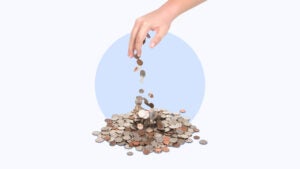Survey: More than 1 in 3 Americans earn money through side hustles, 32% think they’ll always need them

If you spent your free time in the last year picking up jobs on gig apps, freelancing, working a weekend job or developing a hobby into your full-time career, you’re one of the many Americans who’ve been hard at work on a side hustle.
More than one-third (36 percent) of U.S. adults earn extra money beyond their main source of income through a side hustle, according to new data from Bankrate’s Side Hustles Survey.
Working side jobs can be a great way to explore a passion or grow a new business, but for many Americans, it’s also another way to pay their bills. More than 1 in 3 (36 percent) side hustlers use side hustle income to pay for regular living expenses, like rent and groceries, and 32 percent of side hustlers think they will always need that work to make ends meet.
Even as inflation cools, the high percentage of people with a side hustle shows many Americans don’t feel they can sustain their lifestyles on one income alone. Read on to learn more about the many Americans taking on side hustles — and why they’re chasing those extra funds.
While it's admirable that so many Americans are putting in extra time and effort on their side hustles, it's unfortunate that most are doing so simply to fund their expenses.— Ted Rossman, Bankrate Senior Credit Card Analyst
Bankrate’s insights on side hustles
- Side hustling is bringing in more money year-over-year. The average side hustlers say they make $891 on average per month in extra income aside from their main source of income, up from $810 in 2023.
- Most side hustlers started after 2022. 52% of side hustlers have been making money on the side for two years or less.
- Side hustlers are roughly equally split on how they spend their money. 37% of side hustlers agree they use at least some of their side hustle income to fund discretionary spending; 36% use at least some to pay for regular living expenses; 31% save at least some and 20% use it to pay down debt.
- Side hustling isn’t always a one-time gig. 32% of side hustlers think they will always need a side gig to make ends meet.
Nearly half of Gen Zers and millennials have a side hustle
The percentage of Americans with a side hustle decreased slightly year-over-year, but it’s still a common way for people to bring in extra cash. Around one-third (36 percent) of U.S. adults have a side hustle in 2024, only down slightly from 39 percent in 2023.
Which side hustles are best for you?
You don’t need to have a specialized skill to pick up extra money. Explore ways both offline and online to make more money and meet your financial goals.
20 ways to make extra moneySide hustles are especially popular with younger adults. Nearly half (48 percent) of Gen Zers have a side hustle, the highest percentage of any generation:
- Gen Zers (ages 18-27): 48 percent
- Millennials (ages 28-43): 44 percent
- Gen Xers (ages 44-59): 33 percent
- Baby boomers (ages 60-78): 23 percent
Source: Bankrate survey, June 10-12, 2024
Also, parents of young children are more likely to have a side hustle than childless adults and those with adult children:
- Parent/guardian of any children younger than 18: 45 percent
- Not a parent/guardian: 36 percent
- Parent/guardian of any children 18 or over: 28 percent
Bankrate Senior Industry Analyst Ted Rossman attributes the popularity of side hustles to Americans’ ongoing cost of living struggles. Thanks to high inflation and rising housing prices, many Americans with a side hustle are taking on the work for the chance to afford their monthly bills, let alone pay for discretionary expenses, travel or save. This is especially true for younger Americans, who are earlier in their careers than older generations, and tend to make less.
“Side hustles are a little less common this year than they were last year, but many Americans are still finding that one job isn’t enough. The cost of living has risen sharply in recent years,” Rossman says.
More than 1 in 4 side hustlers make more than $500 per month
Not everyone reports a large monthly payout from their side hustle, but the average figure can be a much-needed boost to someone’s monthly income. The average side hustler makes $891 per month in extra income, up from $810 in 2023.
Notes: Respondents were asked to round to the nearest dollar; Percentages are of U.S. adults with a side hustle; Percentages may not total 100 due to rounding.
Source: Bankrate survey, June 10-12, 2024
Younger generations are more likely to have a side hustle, and they also report larger payouts. Millennial side hustlers bring in $1,129 per month on average in extra income, the most of any generation:
- Gen Z side hustlers: $958
- Millennial side hustlers: $1,129
- Gen X side hustlers: $751
- Baby boomer side hustlers: $561
Overall, more than a quarter (28 percent) of side hustlers make more than $500 per month in extra income. While Gen Zers are the likeliest generation to have a side hustle, only 21 percent of Gen Z side hustlers make more than $500 on average in extra income per month, the lowest percentage of any generation:
- Gen Z side hustlers: 21 percent
- Millennial side hustlers: 34 percent
- Gen X side hustlers: 29 percent
- Baby boomer side hustlers: 26 percent
The gender pay gap between men and women is well documented in full-time roles, but it also appears in side hustles. Only a slightly higher percentage of men have side hustles compared to women (38 percent of men, compared to 33 percent of women), but men make far more. Men with a side hustle make $1,034 on average in extra income per month, compared to only $735 per month on average for women with a side hustle.
Most Americans are new to side-hustling
The majority (52 percent) of U.S. side hustlers have been making money on the side for two years or less — that includes 24 percent who have been side hustling for less than a year:
- Less than a year: 24 percent
- 1 to 2 years: 28 percent
- 3 to 5 years: 25 percent
- 6 to 10 years: 13 percent
- 11 to 20 years: 5 percent
- More than 20 years: 5 percent
Notes: Percentages are of U.S. adults with a side hustle; Percentages may not total 100 due to rounding.
Source: Bankrate survey, June 10-12, 2024
Younger generations have had less time to build a side business, so it makes sense that the majority of Gen Z side hustlers (77 percent) and millennial side hustlers (52 percent) have been bringing in money on the side for two years or less:
- Gen Z side hustlers: 77 percent
- Millennial side hustlers: 52 percent
- Gen X side hustlers: 36 percent
- Baby boomer side hustlers: 41 percent
Nearly 1 in 3 side hustlers believe they will always need a side hustle to make ends meet
No matter who brings in side hustle income or how much they bring in, chances are they’re using the funds for fun money, bills or savings.
A roughly equal percentage of side hustlers use the extra income to fund discretionary spending (37 percent), regular living expenses (36 percent) or savings (31 percent). Only 20 percent use the money to pay down debt.
Notes: Percentages are of U.S. adults with a side hustle; Respondents could select more than one option.
Source: Bankrate survey, June 10-12, 2024
People using side hustle income for everyday expenses likely will continue to do so. Nearly one-third (32 percent) of side hustlers say they think they will always need a side hustle to make ends meet. For others, side hustling isn’t forever — 16 percent of people with a side hustle plan to develop it into their main source of income.
Whether it’s a necessity or a means to your dream career, the enduring popularity of side hustles isn’t likely to fade any time soon. So long as people have the time and desire to meet more financial goals, they’ll put in extra hours to make it happen.
FAQs
-
A side hustle is any extra income someone earns on the side of their main source of income, such as their primary job.
-
The average side hustlers make, on average, $891 per month, according to Bankrate’s Side Hustles Survey.
-
While side hustlers make, on average, $891 per month, according to Bankrate’s Side Hustles Survey, 25% of people only make between $1 and $50 per month on average through their side hustle. It may take more work — and time — before your side hustle is worth it.
Methodology
All figures, unless otherwise stated, are from YouGov Plc. Total sample size was 2,332 US adults, of whom 822 have side hustles. Fieldwork was undertaken between 10th–12th June 2024. The survey was carried out online and meets rigorous quality standards. It employed a nonprobability-based sample using both quotas upfront during collection and then a weighting scheme on the back end designed and proven to provide nationally representative results.
Why we ask for feedback Your feedback helps us improve our content and services. It takes less than a minute to complete.
Your responses are anonymous and will only be used for improving our website.






